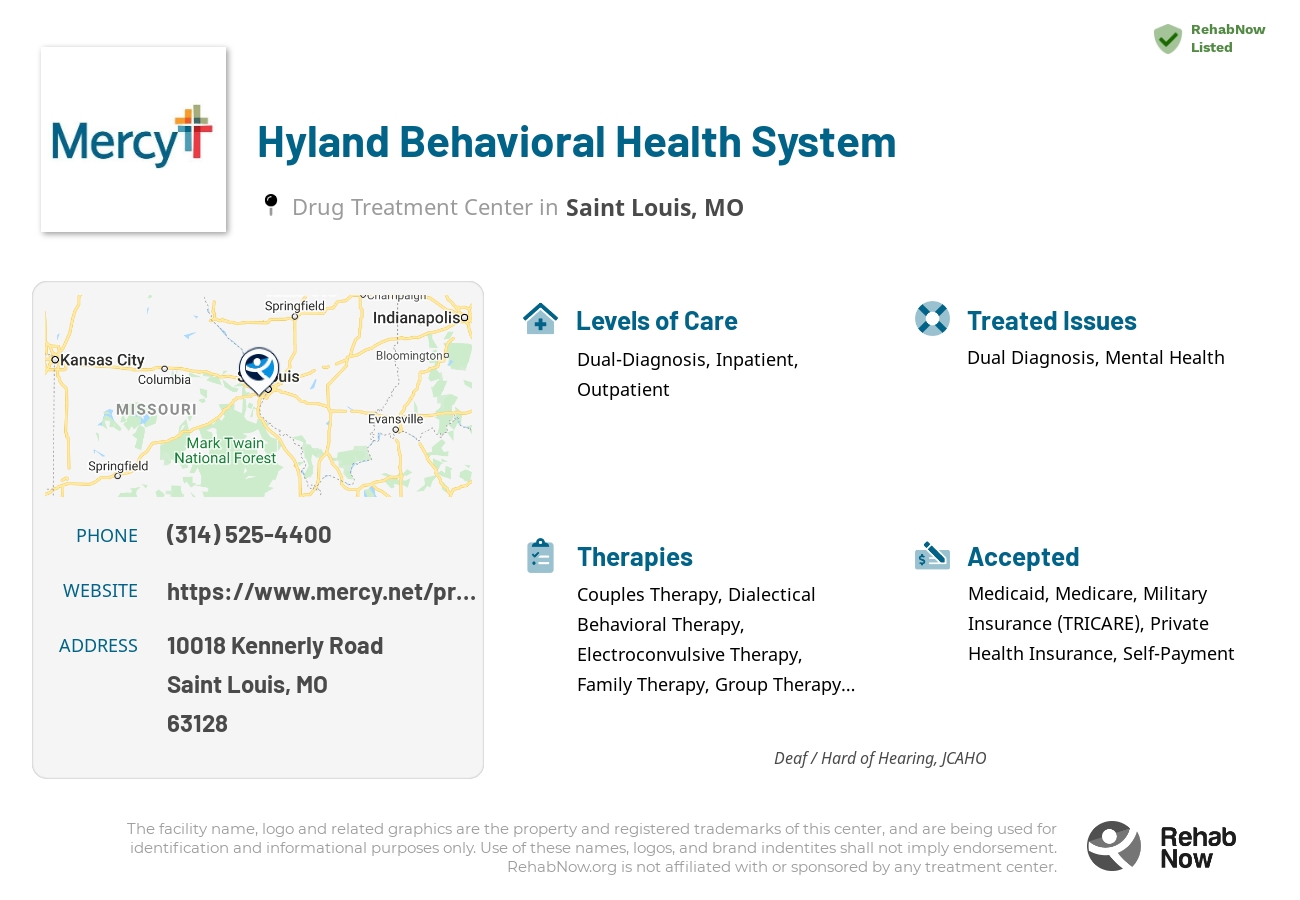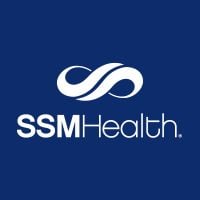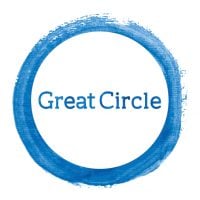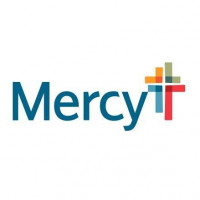
Hyland Behavioral Health System
Drug Rehab Center in Saint Louis, Missouri
- Mental Health
- Dual Diagnosis
Hyland Behavioral Health System offers tailored addiction and substance abuse treatment with licensed and certified professionals, providing a full range of care including outpatient, residential, and medicated-assisted treatment, along with family programs and educational sessions, and is accredited by The Joint Commission in Behavioral Health and licensed by the Missouri Department of Mental Health and Substance Abuse.
About Hyland Behavioral Health System in Missouri
Hopewell Center, nestled in Saint Louis, Missouri, is a private rehabilitation facility renowned for its expertise in treating dual diagnosis and mental health issues. This center distinguishes itself through its dedicated focus on addressing the complexities of co-occurring disorders, offering a holistic approach to recovery that incorporates both psychiatric and substance abuse treatment.
Accredited by the Joint Commission on Accreditation of Healthcare Organizations (JCAHO), Hopewell Center stands out for its commitment to high-quality and safe treatment practices. They embrace a comprehensive treatment model, providing personalized care plans that combine traditional therapies with holistic and evidence-based methods.
- Specializes in treating dual diagnosis, offering integrated care for individuals facing both mental health and substance abuse issues.
- Provides a broad spectrum of care levels including inpatient, outpatient, detox, and aftercare support, catering to varying needs and stages of recovery.
- Utilizes a blend of evidence-based therapies, including Cognitive Behavioral Therapy (CBT) and Dialectical Behavioral Therapy (DBT), tailored to the individual's needs.
Hopewell Center addresses a wide range of addictions and issues such as opioid addiction, substance abuse, drug addiction, and alcoholism. Their treatment methods are diverse, ranging from individual, group, and family counseling to holistic treatments like yoga and nutrition counseling, ensuring comprehensive care and support at every level of treatment.
Genders
Ages
Modality
Additional
Accreditations

JCAHO
Conditions and Issues Treated
Levels of Care Offered
This center offers a variety of custom treatment tailored to individual recovery. Currently available are Dual-Diagnosis, Inpatient, Outpatient, with additional therapies available as listed below.
Inpatient treatment for alcoholism or drug addiction is an option that provides the addict with a supportive environment in which they can stop using. This type of treatment is appropriate for addicts that are most in need of intensive care and supervision. This includes those who were unable to quit on their own, those who need more structure than they can get in outpatient treatment.
“Outpatient treatment is ideal for those who have a lower intensity addiction. It’s also suitable for those with a supportive environment and those on a tight budget.
Outpatient treatment can be considered the lowest intensity level of addiction treatment. It is ideal for early phase addiction or lower intensity addictions. It may involve weekly sessions instead of daily. Peer group support, 12-step programs, and individual counseling may still be used and anti-addiction medication.
Therapies & Programs
No single treatment works for all addicts; therefore, the goal of treatment and therapy should be to find what works best for each individual. Some people requiring addiction treatment may only need a few weeks of inpatient care. Others will require long-term residential care. Tolerance and withdrawal levels vary from person to person and thus affect the intensity of the treatment needed.
If an individualized approach to treatment and therapy is not offered, addicts may fail to reap benefits from their efforts. Professionals must customize plans according to their patient’s needs, limitations, and strengths. The goal of all forms of addiction treatment should be for addicts to find healthy ways to cope with their addiction and its underlying causes.
Couples therapy for drug addiction is a unique form of therapy that allows family members to work through the emotional issues of their loved one’s addiction together. Family members can support each other while learning how to cope with the addiction and encourage healthy changes.
Accordingly, couples therapy for drug addiction is designed for an addict and their significant other or spouse. The two will work with a therapist to learn how the addiction affects themselves and the relationship and how to break the negative patterns of behavior that may have developed.
Drug addiction can destroy a person’s life, as well as their family and friends. The loss of one’s ability to choose how to live and behave often leads the addict into depression, anger, guilt, and many emotional problems.
The therapies usually include siblings, children, and parents who are involved in their daily lives. These sessions are vital because they address past issues that may have hampered an addict’s or alcoholic’s recovery and provide support at a crucial time!
One of the most critical aspects of family therapy is helping addicts’ loved ones see their situation in a new light. It’s also one of the most challenging things a family can do when a loved one struggles with addiction or alcoholism.
Group therapy is held in a safe, controlled setting where patients can feel comfortable sharing their struggles and gaining perspective through shared conversations. It takes place in a group rather than one on one to prevent feelings of isolation or being unique in their situation while creating an environment for addicts at Hyland Behavioral Health System to develop fellowship, accountability, and support. Group therapy is an important tool in recovery that prevents cravings that prompt a return to active addiction.
Dialectical Behavior Therapy is a form of Cognitive Behavioral Therapy that helps patients understand the relationship between their thoughts, feelings, and behaviors. It is beneficial for those whose addictions and behaviors stem from severe mental health issues. It aims to help the patient achieve their goals and identify how they can enhance their lives.
Cognitive-behavioral therapy is a talking-based method that helps people struggling with addiction replace destructive behaviors with healthier ones. CBT also helps them identify the underlying thoughts and beliefs that cause these behaviors in the first place and ways to control those thoughts and feelings. It can be administered as a holistic therapy or as part of combination therapy and—as opposed to turning to drugs and alcohol—helps addicts learn how to respond to negative thoughts instead.
Payment Options Accepted
For specific insurance or payment methods please contact us.
Is your insurance accepted?
Ask an expert, call (888) 674-0062
Additional Details
Specifics, location, and helpful extra information.
Saint Louis, Missouri 63128 Phone Number(314) 525-4400 Meta DetailsUpdated April 15, 2024
Staff Verified
Hyland Behavioral Health System Patient Reviews
There are no reviews yet. Be the first one to write one.
Saint Louis, Missouri Addiction Information
Opioid-related overdoses in Missouri have been increasing steadily for the past three decades. In 2018, more than 1,130 people in Missouri died from opioid abuse. Methamphetamines and marijuana abuse have surpassed opioid abuse in Missouri. Missouri is the number 1 methamphetamine manufacturer in the country with more than 27 meth labs per 100,000 people.
Saint Louis, Missouri, has a severe drug addiction and abuse problem. In fact, according to recent statistics, Saint Louis ranks in the top 10% of cities in the United States with the highest rates of drug abuse. Some of the most commonly abused drugs in Saint Louis include cocaine, methamphetamine, and heroin. Some types of treatment available in Saint Louis, MO, include detox, inpatient treatment, outpatient treatment, and 12-step programs.
Treatment in Nearby Cities
- Neosho, MO (245.6 mi.)
- Osage Beach, MO (123.6 mi.)
- Fredericktown, MO (65.7 mi.)
- Edina, MO (149.5 mi.)
- West Plains, MO (146.9 mi.)
Centers near Hyland Behavioral Health System
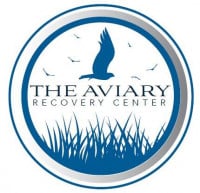
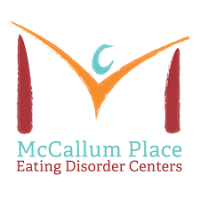

The facility name, logo and brand are the property and registered trademarks of Hyland Behavioral Health System, and are being used for identification and informational purposes only. Use of these names, logos and brands shall not imply endorsement. RehabNow.org is not affiliated with or sponsored by Hyland Behavioral Health System.


